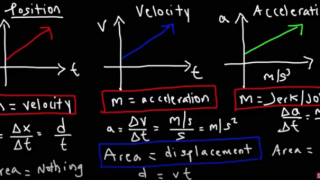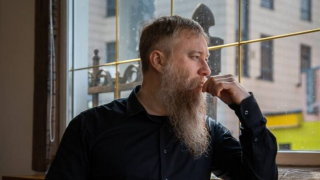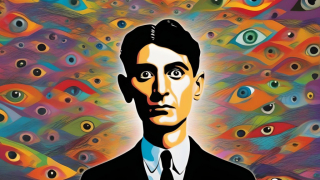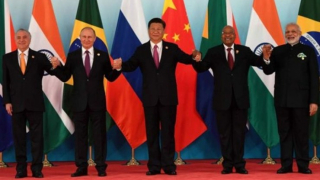A Misunderstood Idea: Troy Southgate's National-Anarchist Movement (N-AM) Manifesto
When the Italian scholar of political doctrines, the historian of the "radical right", the so-called "revolutionary left" or the anarchist movement hears about National-Anarchism and its leading ideologue, Troy Southgate, they are baffled and doubtful in the face of such a thinker and such an innovative worldview (weltanschauung); this is because he is completely ignored in the context of Mediterranean Europe, but Italy in some respects is an exception to the rule.
Troy Southgate was born in London in 1965, graduated in History and Theology at the University of Kent and became the ideologue of a National-Anarchist movement that aims to create new syntheses and go beyond the right and the left. Fortunately, in Italy Southgate's thought has been read and is known, even if only marginally, thanks to the dissemination initiative put in place by Edizioni Sì who published his National-Anarchist Manifesto (Edizioni Sì, Milano, 2018) and thanks to the interest of Libere Comunità, which partly takes up Southgate's thought in its communitarian elaboration. This article aims to try to objectively illustrate Southgate's thought and understand, what the Italian reader can draw from his ideas in our age of pure dissolution.
Let us start from the beginning, from the definition of National-Anarchism; what does it mean? What does it represent? An oxymoron? Absolutely not, for Southgate anarchism must free itself from the distortions that the left has imbued it with. The left is an ideology functional to the system, in fact, the young anarchist who will call to the left thinking he is really an anarchist will remain a hedonist who criticizes society with the mere appearence of being more or less "militant" but in fact is an integral part of the system because he does not know how to go beyond the materialism of anarcho-communism and cannot separate the thought of thinkers like Bakunin, Kropotkin or Proudhon from that of Marxism. Indeed, they often do not even know who Marx is and are content to drink a bottle of Coke to forget. In this regard, the words of Nicolás Gómez Dávila on the fact that the faded insignia of the Communist Party is now forgotten and left in some dark closet whilst the future belongs to Coca Cola and pornography (see Pensieri Antimoderni, Edizioni di AR, Padova, 2010) are very topical.
Another mistake made by the left, although it will never admit it on behalf of Southgate; is the fact of having transformed anarchy, as well as any ideology that has come into contact with its cultural substrate, into a dogmatic, paranoid and centralised system. Current are the words of our ideologue when he states: "[...] the majority of people on the Left, will not be able to rest until they are able to organise every single minute aspect of the lives of others." (Op.cit. Milan, 2018 cit. p.30) "The Left, just like the totalitarian Right, refuses to tolerate anyone who tries to oppose its vision of an all-inclusive society." (Ibid)
The Left, for Southgate, is part of a paranoid and obsessive-compulsive system (In this regard we cite Kerry Bolton's text, The Psychopathic Left, Gingko Edizioni, Verona, 2018); part of a totalitarian mentality inherited partly from twentieth-century totalitarianisms and, on the other hand, from its own secularised dogmatism that does not know how to go beyond the twentieth century. The Marxian dialectic is now out of date; its devotees should cut their own dead branches to make their 'ideological tree' sprout new buds, but very often they fail to do so because they have forgotten both Marx and how to renew themselves.
Similar observations on the leftist mentality were also made by Theodore Kaczynski in his famous manifesto The Industrial Society and its Future where he describes, in the opening pages, the paranoid nature of the contemporary left that, instead of criticising liberal modernity, focuses on the fear of the 'internal enemy' (any person who does not share the ideals of the left) as if we were still in the time of the October Revolution and our radical-chic were Bolshevik revolutionaries, as well as its taking on and being part of modernity; because it does not know how to go beyond materialism and pure economism to reach new heights and syntheses; as the French philosopher Alain De Benoist also had to say (Cf. Sull'orlo del baratro, Arianna Editrice, Bologna, 2014). This hurts; but it is the bitter truth.
For Southgate anarchy, therefore, is not "making noise in the streets" that is the simple protest that now, often and willingly, does not lead to anything except to remain within our system, so the so-called "voice", but it is necessary to reject the system, have inner freedom brought in the worldly, external, temporal and physical that leads to a free exit from the system as Nick Land explains in his Dark Enlightenment (Gog Edizioni, Rome, 2021); it is necessary to be conscious of one's own freedom and individuality that leads us to constitute and erect a community (a new tribalism, in Southgate's words) that rejects the centralism of the modern nation-state.
Southgate's communitarian vision is not an anarchism that rejects authority, as is commonly understood, but one that gives itself an authority that is natural: that of a community made up of differentiated, radical men united by a common weltanschauung (a common worldview); in this regard, several words are devoted in the Manifesto to the ethnic-racial factor and the identity of a National-Anarchist community; for Southgate, unlike how his critics interpret it, the problem is not so much to be in favour of an ethno-nationalism or a community of different ethnic groups, but to find a common substratum to organise in accordance with a more spiritual vision of life that goes beyond mere biologism; for him both racial supremacism and anti-racist multi-culturalism remain crude; both can be said to be part of the same neo-liberal paradigm, which is neither ethno-national nor multi-cultural, since it wants the destruction of all cultures and all roots, be they ethnic or social, and any identity (it is liquid); to paraphrase Bauman) it is thalassocratic and has the US mentality in common, but it is also profoundly mono-cultural; it wants as its worldview the liberal market society, where precisely the only model is the annihilation of all differences in favour of Americanism and finally the primacy of the Economic over the Political (as written by Carl Schmitt).
Another curious factor in Southgate's philosophy is the linking factor between the National-Anarchist communities; they should somehow co-ordinate, despite their differences, in order to fight, at least initially, state centralism. "Our village-communities will have to arm themselves adequately in order to survive" (cit. p.71) writes our author in his Manifesto in Chapter Nine dedicated to Defence (pp.71-74). It arises, spontaneously, to ask if one sees the world from a Schmittian geopolitical vision given by the great spaces if the small communities and localist realities can join the rise of the era of the continental blocks and the future of multi-polarism as a new world order; the geopolitical vision of the great spaces (e.g. the European space, the Anglosphere, African, Eurasian-Russian, etc.) can join the rise of the era of the continental blocks and the future of multi-polarism as a new world order) can be combined with, on the one hand, a state centralism, and on the other hand, small autonomous communities that somehow co-ordinate among themselves to form larger spaces according to their own culture and geographical location in the world (obviously; a National-Anarchism in Latin America will be different from one in the Anglosphere, as well as one in Central Europe).
Before coming to the conclusion and the human type to which Southgate refers, I would like to say a few words about his vision with respect to the radical Right; despite his political background being typical of this environment, he is critical of German National Socialism and Italian Fascism, both considered crude and totalitarian, similar in many respects to the mentality of the Left, taking as his point of reference the movements, composed mostly of intellectuals and lacking a real common ideological corpus, of the Conservative Revolution (cit. p.40).
We now come to the human type and how, in our time, National-Anarchist ideals can be applied, at least in our spiritual substratum. Starting from the fact that Southgate's ideas, over the years, have been open to further synthesis in the traditional direction, unfortunately we in Italy have not been able to read and deepen that due to a lack of knowledge of his work in southern Europe as mentioned at the beginning of this analysis. That said, what is the National-Anarchist human type? Let our author speak on this subject: "We are looking for a new type of individual, someone who is willing to put his ideals before everything else. This is the mark that identifies a true revolutionary; an activist in selfless service to his or her nation and identity." (cit. p.80) "Particularly from those men in their ranks who are willing to die for their faith. Such heroism in the face of such overwhelming odds can only inspire us." (Ibid.) Finally, "Our ideals must arouse in us the same level of commitment and fanaticism, must give us the same inner strength that generates invincibility. Only if we are able to achieve this can we become a force capable of confronting our enemies." (cit. p.81)
The National-Anarchist human type is comparable to the Differentiated Man of Julius Evola or to the Radical Subject of Aleksandr Dugin or even to the Anarch of Jünger; it must be materially committed to revolutionary change; to the perennial struggle against the current System embodied in liberal globalism but, it must also be righteous and fight its own internal war before undertaking an actual militant life. In this regard; I believe that National-Anarchism can be a conjugable answer to the idea of Tradition, of the ideal of the unity of peoples in a great Space as described by Carl Schmitt as it is, besides being a political way, an inner way, a way of being a way in which differentiated men with their own worldview see that the only way is unity towards the disintegration of the System.
In this regard, despite the differences and divergences between Troy Southgate and Aleksandr Dugin's vision of the Fourth Political Theory, Eurasianism and National Bolshevism, I would like to end by quoting passages from Templars of the Proletariat written by the latter in 1997 (published by AGA, Milan, 2021). Although it refers to the post-Soviet reality of the 1990s, it is still very relevant to our time: "Once again, [it] reveals a certain common type, the intellectual [...], the national-revolutionary, radical and paradoxical, the artist engaged in politics, the conspirator, the mystic and (in his outward appearance) perverse. One might add: mad." (op. cit. p.108) "The traditionalism proper to National-Bolshevism, in general, is certainly left-wing esotericism, the characteristics of which repeat the principles of Tantric Kuala and the doctrine of destructive transcendence. Rationalism and individualistic humanism have destroyed from within the organisations of the modern world which nominally possessed a sacred character. It is impossible to establish the ceremonial conditions of Tradition through a general improvement of the moment. In an eschatological phase, this path of right-wing esotericism is clearly doomed to failure. Moreover, appeals to evolution and gradualism only favour liberal expansion." (cit. p. 46)
Leaving aside the Russian reality of the epoch and the esoteric discourses on the Way of the Left Hand described by Evola and taken up in this work by Dugin one must, in this epoch, not only Ride the Tiger and stand over the ruins; as Evola said in his time, to be truly differentiated, but to go against the tide and to be free of spirit in order to find our spiritual path in our own individuality; only we individuals can do this (something already described by Jünger and in the texts of the various esoteric traditions; see the Zen of Master Yoka Daishi as an example).
And after this; we will be able to find other differentiated men, dedicated to material action and to the creation of communities and new state paradigms that will lead to the Disintegration of the System (Edizioni di AR, Padova, 2010); already described by Franco Giorgio Freda in the 60s and 70s and to our differentiated man who is not only standing, but dancing above the ruins of capitalist civilisation while the last revolution will be carried out by the Acephalus, the headless bearer of the cross, sickle and hammer, crowned by the eternal solar swastika (Op. cit. p. 48). The end of our world; it will start from us who know how to resist it and at the right point of its complete dissolution and therefore end we will dance on its rubble because we began from a multiple syntheses; above all the National-Anarchism of Troy Southgate that is waiting for the future of a New Golden Age.






